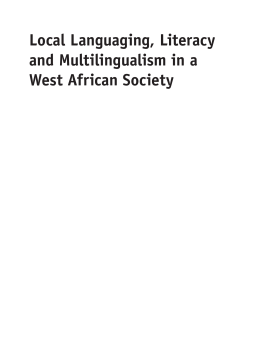
BOOK
Local Languaging, Literacy and Multilingualism in a West African Society
(2015)
Additional Information
Book Details
Abstract
This book aims to enhance and challenge our understanding of language and literacy as social practice against the background of heightened globalisation. Juffermans presents an ethnographic study of the linguistic landscape of The Gambia, arguing that language should be conceptualised as a verb (languaging) rather than a countable noun (a language, languages). He goes on to argue that sociolinguistics should not be defined as the study of ‘who speaks what language to whom, and when and to what end’ (as Fishman defined it), but as the study of who uses which linguistic features under particular circumstances in a particular place and time. The book is therefore in part an exercise to unpluralise language, which Juffermans argues is necessary for a more realistic understanding of what language is, what it does, and what people do with it. The book will be of interest to sociolinguistics researchers, especially those focusing on Africa and the global South.
The book is revolutionary in extolling languaging and ‘grassroots’ literacies as legitimate discourse practices, and as reflecting localised agency with implications for global mobility, in the semiotic landscapes of Africa, and Gambia in particular. In capturing the dynamically integrated multilingual/languaging practices in place, the book highlights the multiple identity affiliations available to the speakers. This book is one solid contribution to the languaging turn in the new sociolinguistics of globalisation.
Felix Banda, University of the Western Cape, South Africa
This delightful book conveys three important points of relevance for anybody interested in language practice in a wider social context in West Africa and beyond: that language use has to be understood as situationally grounded, that it needs to be distinguished from the ideologies of research participants and researchers, and that their critical ethnographic assessment is central, as Juffermans forcefully shows.
Friederike Lüpke, SOAS, University of London, UK
Kasper Juffermans is a sociolinguist and Africanist at the Institute for Research on Multilingualism at the University of Luxembourg. His research interests include language-in-education policies; linguistic landscapes; and language in mobility and migration.
Table of Contents
| Section Title | Page | Action | Price |
|---|---|---|---|
| Contents | v | ||
| Figures and Tables | vii | ||
| Series Editors’ Preface | ix | ||
| 1 How Many Languages Do You Speak? | 1 | ||
| 2 Gambia’s Local Languages | 26 | ||
| 3 Englishing and Imaging in the Linguistic Landscape | 56 | ||
| 4 Voices on English and Local Languages in Education | 79 | ||
| 5 Collaborative Literacy Repertoires | 103 | ||
| 6 Writing Mandinka in the Presence of English | 124 | ||
| 7 Local Languaging Regimes | 141 | ||
| References | 154 | ||
| Index | 168 |
